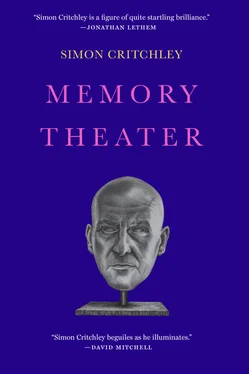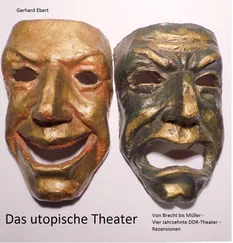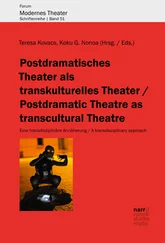Hegel’s philosophy is a mnemotechnic system in the ancient and Renaissance tradition. The difference is that what Hegel adds to his memory theater is time , that is, the experience of becoming. Rather than the static ensemble of Camillo, Hegel’s is a moving theater, a kind of proto-cinema. In the final paragraph of the Phenomenology , Hegel talks of becoming as a slow-moving succession of spirits, a gallery of images, each of which is endowed with all the riches of Spirit, moving slowly so that the self can penetrate and digest the entire wealth of its substance. This is why the Phenomenology can only be read in reverse. It’s like driving a car while constantly looking in the rearview mirror.
The German Erinnerung denotes both recollection and the active experience of making inward. As such, it can be opposed to forms of external, mechanical, technologized, or even neurophysiological memory, captured in the word Gedächtnis . The Hegelian art of memory is the inwardizing of all the shapes of Spirit. In memory, the whole world of history is emptied into subjectivity, filling up the void of the self. This fulfillment is what is meant by absolute knowledge: the unity of the divine and the human, what Hegel calls in the final words of the book “the Calvary of absolute Spirit.”
Absolute knowledge is the final shape of Spirit, the end that returns to the beginning where the movie show begins again, and again, and again. Repetition, repetition, repetition — I thought of Mark E. Smith of the mighty Fall. Perhaps the task of each subsequent generation would be the construction of its own living memory theater, its own construction of the past in thought and image. The difference from Camillo’s theater, which has the subject onstage and the items to be remembered filling the auditorium, is that in Hegel’s theater the subject sits in an auditorium alone and views the shapes of spirit passing onstage in succession on a vast reel, trying to recall them all. For Hegel, what is being recalled is the history of Spirit, namely the very history that implicitly constitutes the viewing subject. What happens onstage is the entire spiritual drama of subjectivity, our drama. Through the art of memory, we learn to see ourselves from the perspective of the whole, from the standpoint of totality. In so doing, we become infinite, divinely human.
Michel’s essaywas astonishing, far and away the best thing I’d ever read by him. I had no idea why he didn’t publish it. It was admittedly the sketch of a larger argument. Maybe he moved on or just lost interest. Typical of him. However, I found the idea of a memory theater, even the Hegelian version, slightly droll, as I had lost much of my memory after the accident. All I remembered from that morning in the pharmaceutical factory was Jilted John playing on the radio—“Gordon is a moron”—and blood all over the floor. I loved that song. It was even more stripped down than conventional punk: two chords instead of three. Then my hand got trapped in the machine by inch-thick steel paddles. Steel slicing flesh. After I pulled out my hand, horribly mangled and hanging by what looked like bloody tendons, threads, and shards of bone, I collapsed.
I remember being blissfully out of my brain on pethidine in a hospital bed and trying to put my hand up a nurse’s skirt. Then I blacked out. Then I remember going into the operating theater. I blacked out again. My dad was by my bedside as I came around, my hand suspended above me and wrapped in vast bandages. It was dark and I told him that it wasn’t my fault this time. Then I lost consciousness again.
After three operations and as many weeks in hospital, I was told by the specialist that my hand wouldn’t have to be amputated. Here it is in front of me right now, arthritic and disfigured with a huge skin graft scar, but still capable of slow two-finger typing. Tap, tap. A registered disability, no less. It’s like that bloody short story by Maupassant. I kept my hand, more or less, but lost large fields of my memory. This was the effect of the trauma, doctors told me. How reassuring. I would get flashbacks, for sure, but they were often vague and they didn’t necessarily feel like my memories. My self felt like a theater with no memory. All the seats were empty. Nothing was happening onstage. I sat back in my office chair and closed my eyes.
Reg Varney, one of the university security guards whom I’d known since I was an undergraduate at Essex, woke me. It was getting really late and I had a longish drive back to the perfectly anonymous village I used to stay at on the Suffolk border. I decided to leave the last box for tomorrow, marked Pisces . My star sign.
I got back to the little house I rented, Churchgate Cottage, next to a medieval graveyard that surrounded an undistinguished fifteenth-century parish church. The nearest grave belonged to one James Brown, deceased in 1748. Where be your funk now? I drew a very hot bath and lay there, turning things over in my mind and listening to the shipping forecast on the BBC. A repeat-loop surrealist poem:
Dogger, Humber, German Bight. Southeast veering southwest four or five, occasionally six later. Thundery showers. Moderate or good, occasionally poor.
Forties, Viking. Northeast three or four. Occasional rain. Moderate or poor.
Rockall, Malin, Hebrides. Southwest gale eight to storm ten, veering west, severe gale nine to violent storm eleven. Rain, then squally showers. Poor, becoming moderate.
Moderate or good, occasionally poor. Poor, becoming moderate. I lay in the steaming water and mouthed the other regions of the sea: South Iceland, Biscay, Fitzroy, Trafalgar. Bliss. It was an incantatory memory poem. Recall the sea and retain the land. Jede Englander ist ein Insel . Appropriately enough, the late-night forecast was always followed by the national anthem. The islands were safe. We could all rest.
I went to bed. With the sound of automated bells in the church tower outside and the discreet aid of Ambien, I fell into a profound sleep. I immediately began to dream floridly. I was floating, small, angelic or bug-like, inside a vast Gothic cathedral. It looked like the capacious nave of Lincoln Cathedral, but it was truly some kind of compound image of Canterbury, Norwich, Beverley Minster, Peterborough, Ely, and York. I floated up to the ceiling and hovered beneath the roof bosses. I gazed from one end of the cathedral to the other. Each roof boss depicted a stage in the history of the world from Creation onwards through the Fall and expulsion east of Eden, the figural precursors of Christ in the Kings of Israel, onwards into the Nativity, the young Jesus’ lecture in the blinded synagogue, the miracles, Crucifixion, Resurrection, Ascension and, finally, Christ triumphant, in majesty framed by a vast, vagina-like mandala. His beginning is his end.
I gazed at the huge, rose-shaped eastern window, soaking in the hues of ruby red glass and lapis lazuli. Then I descended abruptly into the choir, circling around the lectern in the form of an eagle — St. John — and beneath the stalls. I looked intently at a long series of mercy seats, or misericords, each with elaborate wood carving beneath it. There was an elephant with horse’s feet, a gaping-mouthed fool with his tongue stuck out, a bear being hanged by geese, a series of Jack-o’-the-Greens or Green Men peering out all phallic and menacing, a fox lecturing an audience of ducks, a blacksmith trying to put horseshoes on a dog, endless images of wrestlers, a devil conducting dentistry on a poor open-mouthed soul, and finally the image of a mild-faced mother and child dancing together.
Out I floated into the chapter house, with stone carvings of three-headed kings, veiled women, fighting lions, and tumblers, directly over the dean’s throne. There were many, many monkeys and the carving of a vast serpent eating a cat. The angle of a vault entered the cranium of the Green Man and went out through his mouth. There were mouths everywhere. Fiercely oral architecture. Eucharistic gluttony. Eat the bready body of God and wash it down with his sweet blood — like Leopold Bloom with a gorgonzola sandwich and a glass of Burgundy. Transubstantiation. I thought of seedcake. Back I flew into the body of the cathedral and floated there gazing at its cruciform shape, the simple vaulted ceiling and the light pouring in through the clerestory, down through the triforium into the bays beneath. I felt majestic. Then I was suddenly sucked out of the cathedral roof through an octagonal wooden lantern; my head burst through the glass and I was being pulled up into the air faster and faster. I could see the cathedral’s twin towers receding below me and the vivid green flatness of the English landscape. The sky was getting deeper and deeper blue and I couldn’t breath. The skin on my face was beginning to smolder with the intense heat. I could smell myself burning. Father can’t you see?
Читать дальше












